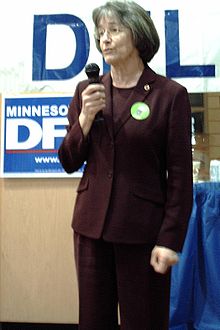Becky Lourey
| Becky Lourey | |
|---|---|
 |
|
| Member of the Minnesota Senate from the 8th district |
|
|
In office January 7, 1997 – January 2, 2007 |
|
| Preceded by | Florian Chmielewski |
| Succeeded by | Tony Lourey |
| Member of the Minnesota House of Representatives from the 14B and 8B district |
|
|
In office January 8, 1991 – January 6, 1997 |
|
| Preceded by | Doug Carlson |
| Succeeded by | Bill Hilty |
| Personal details | |
| Born |
September 24, 1943 Little Falls, Minnesota |
| Political party | Minnesota Democratic-Farmer-Labor Party |
| Spouse(s) | Gene (deceased 2008) |
| Children | 12 |
| Residence | Kerrick, Minnesota |
| Alma mater |
Asbury College University of Minnesota |
| Occupation | activist, homemaker, legislator |
Becky Lourey (born September 24, 1943) is an American politician, a former Minnesota Democratic-Farmer-Labor Party (DFL) state senator and state representative, and a former Minnesota gubernatorial candidate. Her son, Matt, served in the U.S. Army and was killed on May 27, 2005, as a result of injuries received in combat over Buhriz, Iraq, where he was serving in his second tour of duty.
Lourey was elected to the Minnesota House of Representatives in 1990, running against a long-time incumbent Republican, and became the first woman to represent her rural district. She was re-elected in 1992 and 1994. She ran for and was elected to the Minnesota Senate in 1996, again defeating a veteran incumbent, later becoming chair of the Senate Health and Family Security Committee and earning a reputation as an expert on health care.
Lourey did not run for re-election in 2006. Her son, Tony, currently holds her former seat.
Lourey announced her candidacy for Governor in November 2005. She lost the DFL Party endorsement to Attorney General Mike Hatch, gaining the support of 31% of the delegates on the first ballot, with 38% voting for Hatch and 29% voting for Steve Kelley. She withdrew from the endorsement process after the third ballot after falling behind Kelley, with Hatch's vote total increasing. She subsequently ran an opposition campaign against Hatch in the September primary, losing with 24% of the popular vote.
Lourey's gubernatorial campaign health care platform was the Health Care Security Plan, which included the details to put a universal health coverage system in place in Minnesota by 2010. That system would have been voluntary, not mandatory as was the Massachusetts health program that was enacted into law in Spring 2006. The platform also included other state-level health reform proposals, including the current Minnesota Medical Association's proposal.
...
Wikipedia
